#caesarion
Text
Lover’s insomnia. Whispering, we take little bites of each other’s life stories.
Tommy Wieringa, Caesarion (trans. Sam Garrett)
749 notes
·
View notes
Text
Julia Caesaris is so overlooked it makes me wanna scream. She managed to have a happy marriage in a time when that just wasn't much of a thing. Given Cleopatra spent 3 years as a tween in her house we can only assume she mentored the future Pharaoh or at the very least provided tons of information on the Caesars given that's her gens and Julius is her dad so you just know Cleopatra sponged up all this info and used it a few years later when she went to Caesar for help. She was a patroness of the arts and got her husband into them and her death changes the entire course of western history.
Like her death has a greater impact on our world today than Cleopatra's did but absolutely no one talks about her
#ancient rome#roman history#roman empire#julia caesar#julius caesar#pompey#ancient history#ancient egypt#greek egypt#egypt#cleopatra#ptolemies#ptolemaic egypt#caesar#caesarion#caesarians#julia caesaris#julia#julia daughter of Caesar#actium#how often do you think about the roman empire#pharaohs#Ptolemy auletes#auletes#Pompeius Magnus#gnaeus pompeius magnus#pompey the great#magnus#the new Alexander#gnaeus pompey
43 notes
·
View notes
Text
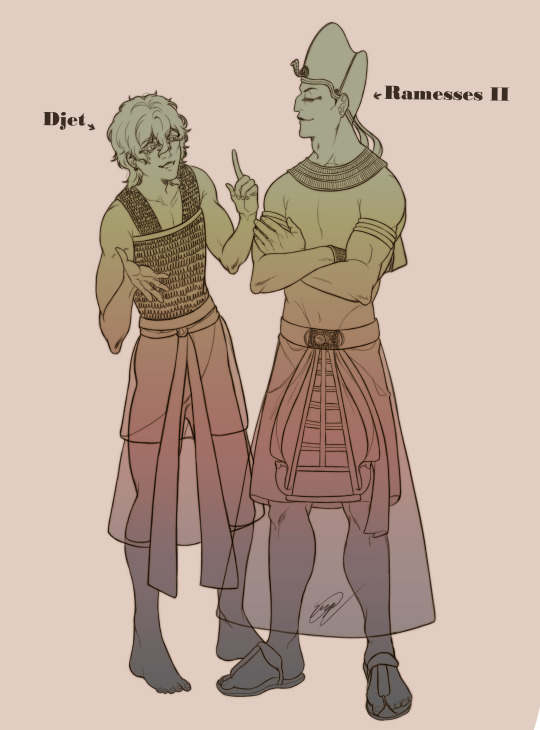

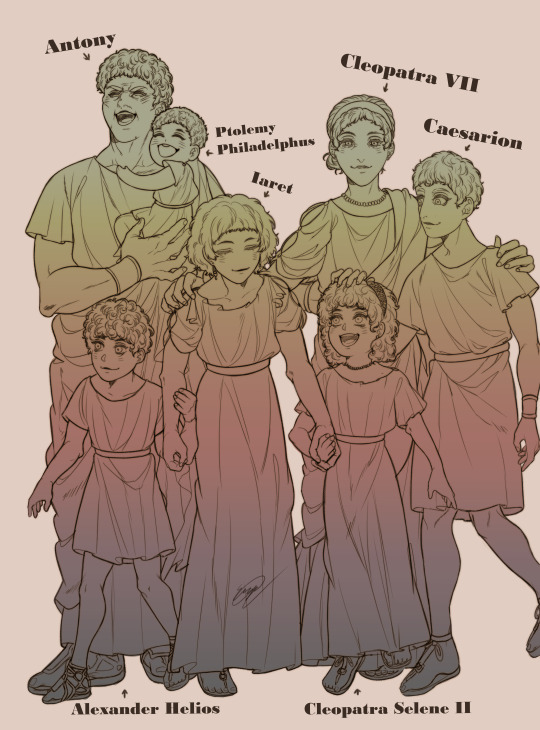







My webcomic characters ft. the historical characters they were close to!
#webcomic#ancient history#ancient egypt#amasis#ramesses ii#ptolemaic egypt#ancient rome#republican rome#cleopatra#mark antony#pharaonic egypt#ptolemy philadelphus#imperial rome#cleopatra selene ii#alexander helios#cleopatra vii#ptolemy xv#caesarion#the gracchi#tiberius sempronius gracchus#gaius sempronius gracchus#cornelia#hadrian#antinous#djet#khawy#iaret/chloe#sempronia#lucius#the followers of the divine snake
31 notes
·
View notes
Text

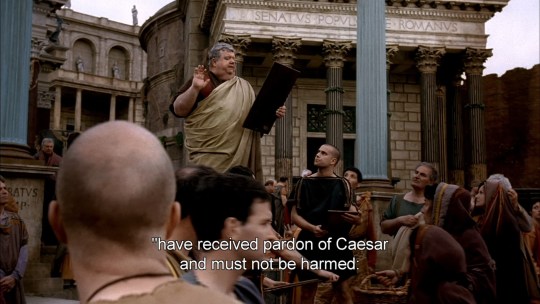

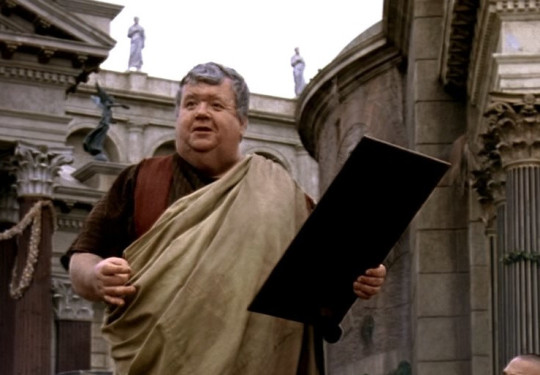


"Brutus, huh? Good for him!"
43 notes
·
View notes
Text


Of all the lost things in the world, the things we will never know, this lost son of Caesar and Cleopatra’s must stand as the most tantalizing. What would he have been, what would he have grown into, with the gifts he had from both his remarkable parents? Octavian did not wish to find out – and so we never shall, either.
Only one small glint of mercy here: Cleopatra never knew of his fate; she closed her eyes and went into the dark believing that he was safe. Isis had protected her to the last from that which would hinder her passage into the other world by grieving her spirit.
The Memoirs of Cleopatra - Margaret George
#cleopatra#cleopatra vii#caesarion#ptolemaic dynasty#ancient egypt#long live the queue#fuck you octavian#he would have been one of the greatest rulers in the world: LOOK AT WHO HIS PARENTS WERE!!!!
46 notes
·
View notes
Note
What was Caesar and Cleopatra’s relationship like?
That...is a difficult question. A few historians are skeptical about whether they even had a romantic affair. Caesar says nothing about it in his account of his trip to Egypt, and there's no record of Caesarion's existence until after Caesar died...But most historians do think the child was his. And it's hard to guess what Cleopatra really felt, since our literary sources are all hostile to her.
Caesar and Cleopatra would have met when he was ~52 and she was ~21. She had already ruled Egypt for about three years, but at that point had lost most of her power and would've needed his support to retake Egypt. The Romans and Egyptians wouldn't have blinked at the age gap. You might argue there was also a power gap, and she might have felt like she had to seduce him to avoid getting killed. He was probably her first sexual experience.
Or maybe they weren't so unequal as that. Cleopatra had dominated Egyptian politics for the last three years, raised an army in her own name, and chose to leave that army and visit Caesar of her own initiative. Caesar desperately needed a friendly, stable Egypt, and she was the only candidate for governing it who was A) competent and B) not trying to kill him. Cleopatra was also incredibly well-educated and resourceful, a skilled administrator and commander, popular with the Egyptian people, and fluent in nine languages. She knew how vulnerable Caesar's position in Egypt really was - and she might have used that to preserve Egypt's independence instead of letting Caesar annex it in 47 BCE.
You could interpret this messy affair in a lot of ways. Was one of them using the other? Were they both using each other? Politics inevitably played a role, but it may have dovetailed with genuine affection. For all his faults, Caesar was certainly better than the homicidal teenage brother-husband Cleopatra was originally supposed to have children with. And Cleopatra was probably not just attractive, but a relief to Caesar, after dealing with said brother-husband and his horrifically incompetent, Roman-hating staff.
After the Alexandrian War, Cleopatra visited Caesar in Rome at least once, probably twice. Our anecdotes from this time period could be read as either continuing a love affair, or as typical diplomacy, with a foreign monarch offering gifts and being entertained in turn. The Romans themselves seem to have had mixed opinions on how appropriate it was. Most historians think Caesarion had been born by this point, but some date his birth to after Caesar's death, since our first contemporary mention of him appears after the assassination.
Caesar never publicly acknowledged Caesarion as his son or left him anything in his will. But then, Roman law wouldn't have allowed Caesar to make Caesarion his heir anyway. Cleopatra was present in Rome during the Ides of March, and left with her son soon after the will was read.
Most fictional portrayals play up the romantic angle of Caesar and Cleopatra's relationship. And that's fine. But personally, I like to see the funny side of things, and to me Caesar and Cleopatra's affair reads like a bizarre, hilariously awkward black comedy. I haven't yet found a portrayal of them that I really like.
44 notes
·
View notes
Text
Denderah - Carvings with Cleopatra VII and her son Ptolemy XV Caesar

The colossal carving of Cleopatra VII Philopator (51-30 BC) and her son Ptolemy XV Caesarion (44-30 BC) before the gods, on the south exterior wall of Temple of Dendera. The large goddess on the right, the first of a procession of deities not included in the photograph, is Hathor. The present temple at Dendera is essentially a Ptolemaic structure, with the exception of the mammisi (or 'birth house') erected by Nectanebo I (380-362 BC), which represents the earliest surviving structure of the complex, and later Roman additions, such as the first hypostyle hall, built by the Emperor Tiberius (42 BC-AD 37). There is evidence, though, that the temple was built on the site of a previous one, dating at least from the early New Kingdom (around 1500 BC) with suggestions of structures being present in the area at the time of Pepy I (2321-2287 BC). The temple, one of the best preserved in Egypt, is dedicated to Hathor. The goddess is usually represented as a cow, often with the solar disc between the horns, in human form with, similarly, the solar disc between cow horns, such as in this case, or as a woman with cow’s ears. Her name means ‘house of Horus’ and, as the living king was identified with Horus, Hathor was considered the divine mother of the pharaoh, who had ‘son of Hathor’ as one of his royal titles. It is then certainly not a coincidence that Cleopatra decided to have this colossal scene carved onto a wall of the temple of Hathor.
#cleopatra#caesarion#cleopatra vii#ptolemy xv caesar#dendera#dendera temple#ancient history#history#archeology#ancient art#art#ptolemaic dynasty#ptolemaic egypt#ptolemies#ancient egypt#egypt#carvings#hathor#horus#gods#egyptian gods
16 notes
·
View notes
Text
The Ninth Day of Julius Caesar
As a person who enjoys looking at retrospective diagnoses maybe a little bit too much, I have read quite a significant amount of works regarding Julius Caesar. He is traditionally said to have had epilepsy (though we don't know for sure if it's true or not) and so many people have done medical speculation over him over the years.
However, no one's perfect!
My favourite source on this topic will always be Julius Caesar's Disease by Francesco Galassi and Hutan Ashrafian. It's a very neat book about the history of this topic and it looks at bunch of other people's theories, but mainly it argues that Caesar did not have epilepsy but transient ischemic attack. I don't like it because I hate the epilepsy theory and really like this new theory (I consider myself to be neutral in this topic because we can never know), I like it because it is the first thing I've read on this topic that actually had some common sense and wasn't making mistakes all over the place!
However, it's pretty recent, from 2015, and people writing between 2004 and 2015 couldn't use it, so they all went and used a source I don't really like.
Enter "Dictator Perpetuus: Julius Caesar—Did he have seizures? If so, what was the etiology?" by John R. Hughes.
A hint about what I dislike about this source is that it was published in a medical journal. If a retrospective diagnosis work is published in a medical journal, prepare for good medical information but bad historical information. And if it is published in a history journal, vice versa. Context matters! Everyone publishing stuff about this are either doctors or historians and usually it's easy to tell which one the writer is.
Anyway, this one... it could be worse. It's certainly not the most diabolical thing you could read in the whole retrospective diagnoses of Caesar topic (that would go to "Searching for Neurological Diseases in the Julio-Claudian Dynasty"!) but there are a few parts of it that are very poorly done. And for some reason, the only parts that had any influence at all are the poorly done parts!
In the abstract, there is one silly sentence that is the bane of my existence: "His son, Caesarion, by Queen Cleopatra, likely had seizures as a child, but the evidence is only suggestive."
The evidence is only suggestive? I didn't know that was a euphemism for "I cited a modern historical fiction novel," because that's where the evidence came from. Historical fiction!
At least Hughes is pretty honest about where his information comes from and he does say that the only source for that is historical fiction and not ancient sources. But, why put it in?
Anyway, probably from the vague wording in the abstract, it's become a common misconception that Caesarion had epilepsy. People keep saying that and citing this work but if they had actually read it, I don't think they would've been impressed or convinced. Because in the text itself, it's clear that the source is historical fiction! It's only ambiguous in the abstract.
Maybe Caesarion did have epilepsy, we don't know much about him, but there is no evidence at all because historical fiction doesn't count as evidence.
This is actually mentioned in Julius Caesar's Disease! Unfortunately I cannot find the book right now, but I remember that it basically said "I like Masters of Rome, but I don't cite it!"
The author of one of the historical fiction novels actually said in the author's note "This detail about Caesarion I made up and there is no ancient sources that support it. It's not completely impossible, but don't cite this," and guess what happened? I feel so bad for her. If I was unwillingly the cause of a misconception, either my ego would balloon or I'd run away and become a hermit.
(Did you know that once an AI plagiarized me? I was talking to a chatbot about ancient Rome and I was really agreeing with it. I was like "wow this is literally exactly what I would write about this" and then I realised that it was literally exactly what I wrote about it because the AI had stole my words! Seeing my idea somewhere else certainly made my ego ten times bigger so maybe if I start a misconception it'll have the same effect?)
What's funny is that if I had a nickle for everytime this happened (someone citing a historical fiction book in which a male teenager who had a famous father and could've been heir to him and who is a part of Roman history during the first century BC to the first century AD had a medical condition in the historical fiction novel that is not supported by any ancient source and then a bunch of people citing the person who originally cited the historical fiction book until that detail becomes a misconception), I'd have two nickles. How does this happen twice? And how it that the two historical figures are so similar too? This misconception (not the Caesarion one) made its way onto Wikipedia so that's fun!
I know this misconception isn't actually about Caesar, but Caesarion. It's somewhat relevant to Caesar so it's fine! Alright guys remember, historical fiction is not a good source. This theory about Caesarion doesn't have "suggestive" evidence, but no evidence at all.
I'm sorry that I've really been slacking with my series. And I'm sorry that today's post is probably completely unreadable (I was really struggling to make words make sense). I promise I'll finish eventually, because once I finish this series, I'll finally be free.
#the 15 days of julius caesar#ancient rome#julius caesar#gaius julius caesar#caesarion#ides of march#the ides of march#roman history#historical fiction#retrospective diagnoses#medical history
15 notes
·
View notes
Text

I've made another piece reminding everyone that Resurrection OCT is open and in the process of accepting auditions. This was based on a joke I made about how Caesarion often trips over Hurvey's vines, and Blanca is sometimes the most level-headed of the group.
Please feel free to DM me if you would be interested in joining the Original Character Tournament!
Caesarion (left) is my judge character!
Hurvy (middle) belongs to @alfafilly
Blanca (right) belongs to @cloudbatcave
20 notes
·
View notes
Text
Did you know Cleopatra's daughter, Cleopatra Selene, rose to become a queen herself? The captivating story of Cleopatra’s children caught in a web of power and betrayal tells of their tragic fates and the secrets of a dynasty lost to history.
#Cleopatra VII#Cleopatra Selene#Egyptian Rulers#Roman Republic#Ptolemaic Dynasty#Caesarion#Mark Antony#empire#Egypt#Roman Figures#Queens#Julius Caesar#ancient#history#ancient origins
43 notes
·
View notes
Text
Shoot anon, I deleted your ask trying to edit it.
I was asked why I didn't like HBO's Rome.
So many reasons. Mostly, I think, because despite being more accurate about the setting than many period pieces, it still felt the need to edit historical happenings/people.
It also did things with some of the historical characters I just didn't really like or feel the need for. Read on if you don't care about spoilers...
Cleopatra is a drug addict and not very clever? UGH. Ew. Solely portrayed as seductive and that's it, honestly. Caesarion is not the son of Caesar but a random soldier? The Antony/Cleopatra romance was...barely present? Actium was an afterthought? Barely anything about the battle of Alexandria where Antony almost won? Both weren't really on screen.
Both Octavias are blended into one and also have sex with Octavian. Why? Also why was Atia such a huge character? Why were she and Antony having an affair? Fulvia would have been a great addition to the show. Also where are Antony's children? Absolutely gone. Julia was also missing.
Agrippa and Octavian were not extremely close, there was no real hint of love there brotherly or otherwise, and Agrippa was in love with Octavia?
I mean there is enough drama in history without all of the changes, trust me.
So I think it is because of the potential it had, due to where it was accurate, that I became more frustrated when it wasn't. If that makes sense.
I wouldn't have finished it but it was something my mom wanted to do together to validate my interests, I think. Heh.
It did have some funny moments and some great scenes. I just overall did not care for it. Maybe you might like it, though?
#I am quite sure I was not fun to watch this with#I felt the need to point out the wrong bits#so we should all feel sympathy for my mom xD#HBOs rome#hbo rome#ancient rome#octavian#mark antony#marcus agrippa#octavia minor#cleopatra vii#caesarion
19 notes
·
View notes
Text
Caesarion - C.P. Cavafy - Greece
Translator: Avi Sharon (Greek)
In part to verify a date,
and in part just to pass the time,
last night I picked up a volume
of Ptolemaic inscriptions and began reading.
Those endless poems of praise and flattery
all sound the same. All the men are brilliant,
great and good, mighty benefactors;
most wise in all their undertakings.
The same for the women of the dynasty, all the Berenices
and Cleopatras, wonderful, each and every one.
When I managed to find the date in question,
I'd have put the book aside had a brief mention
of King Caesarion, an insignificant note really,
not suddenly caught my eye...
Ah, there you stood, with that vague
charm of yours. And since history has devoted
just a few lines to you, I had more freedom
to fashion you in my mind's eye...
I made you handsome, capable of deep feeling.
My art gave your face an appealing,
dreamlike beauty. In fact, I imagined you
so vividly last night, that when my lamp
went out—I let it go out on purpose—
I actually thought you had come into my room;
you were there, standing before me,
just as you would have looked in defeated Alexandria,
pale and tired, ideal in your sorrow,
still hoping for mercy from those vicious men
who kept on whispering 'too many Caesars.'
5 notes
·
View notes
Text
I could maybe forgive Caesar for his life if it wasn't for what happened after his death! Hoebag literally screwed everyone over.
Didn't acknowledge Caesarion as his heir. Didn't even mention Antony at all. And saddled the world with the nightmare that was a young Octavian who now had clout. If he hadn't promoted that bloodthirsty twirp by making him his heir I could almost forgive him for the things he did in his life.
#roman history#ancient rome#roman empire#how often do you think about the roman empire#ancient history#julius caesar#augustus#caesar#octavian#Octavianus#roman civil war#caesar augustus#gaius julius caesar#caesars will#ides of march#cleopatra#cleopatra vii#marcus antonius#mark antony#caesarion#ancient egypt
8 notes
·
View notes
Text
Some men : * take their wives on a luxury hotel vacation, take their kids to a theme park trip, give their girlfriends a promise ring/badge *
Julius Caesar :
* tries to have Mansions of the Gods built as an invasion tactic on the Indomitable Gauls AND as a dedication gift for Cleopatra ( Mansions of rhe Gods )
* tries to have Las Vegum built as a dedication gift for Caesarion ( I think as s 1st birthday gift ) in Asterix : Las Vegum
* gives Cleopatra a large pearl from the Black Sea regions as a promise ring like gift
* plans to publish ' My Best Love Letters to Cleopatra ' featuring a number of his love letters to her ( Asterix and the Missing Scroll )
* had a statue of Venus and Cupid modeled after Cleopatra and Caesarion built in 46 BC Venus Day ( Ancient Roman Valentine's Day on 1st April ) as q Venus Day gift
🤯🤯🤯🤯🤯🤯🤯🤯
#asterix#asterix et obelix#julius caesar#cleopatra#caesarion#caesar x cleo#yes the venus and cupid statue gifts actually did happen
23 notes
·
View notes
Text



21 notes
·
View notes
Text

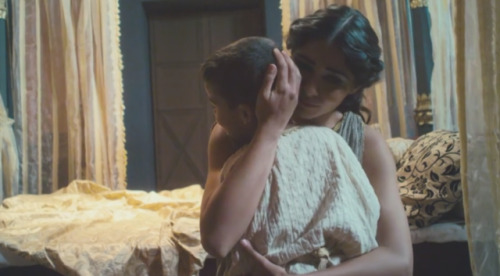

Cleopatra and Antony have, of course, been immortalized in history and popular culture, and Cleopatra’s eldest child Ptolemy Caesar, better known as Caesarion, whose father was Gaius Julius Caesar, is a relatively well-known historical figure. However, the three younger children have been all but forgotten. After their parents committed suicide in quick succession, Caesarion was executed at the age of seventeen by Octavian, soon to become the first Roman emperor Augustus. As Caesar’s biological son - Octavian himself was merely an adopted son, and a posthumously adopted son at that - he represented too much of a threat to be left alive.
Cleopatra’s Daughter - Jane Draycott
#cleopatra#cleopatra vii#caesarion#ptolemaic dynasty#marc antony#mark antony#fuck you octavian#long live the queue
30 notes
·
View notes